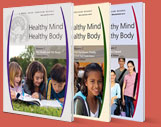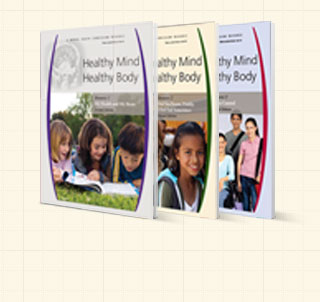About the Books: Healthy Mind - Healthy Body
Dr. Lauria-Horner became interested in mental health while practicing as a family physician. It became apparent that mental health was a key part of one’s wellbeing. She has witnessed countless adults experiencing emotional problems which began in childhood or adolescence. Many did not seek help because they felt shame, different from others, or simply did not know if what they were feeling was expected. The literature reveals a lack of youth’s (ages 16-24) specific knowledge regarding what they articulate as their needs when they feel something is not right. It is not uncommon to think that children do not have the emotional maturity to suffer from emotional problems. The result, they suffer in silence.
Dispelling stigma requires education programs in schools which can improve children’s understanding of mental health and illness in the early learning years, where multiple “teachable moments” exists. Overall, the goal is to have youth automatically think about health as being physical health and mental health. Students should learn how every part of the body including the brain affects our health. As students become more comfortable talking about mental health, discussions about it would be just as natural and common place as nutrition health or cardiovascular health. This will hopefully help youth to freely talk about and express their feelings, and recognize if feelings and behaviors are interfering with healthy development. In addition it is important to teach students the proper language when referring to mental health and illnesses, and begin to discourage and with time eliminate negative terms such as “crazy,” or “nervous breakdown” or “mental.” We want students to understand that mental illnesses should not be regarded as shameful (something not to be talked about) or that somehow a person must be weak if he/she cannot “shake” a certain “bad feeling”.
A public health approach to mental health promotion cannot comprise only of treatment efforts. We need to include factors that promote mental health and reduce stigma. Although there are many diverse efforts and programs required to accomplish this, it is felt that that an elementary and junior high school educational component on mental health and illness would certainly have an impact. Healthy Mind Healthy Body has been piloted and evaluated in Nova Scotia. We obtained objective, subjective, and anecdotal evidence indicating improvements in knowledge and attitudes of students in grades 4 to 7, particularly regarding anxiety and ADHD. We also observed improved knowledge of help-seeking behaviour strategies (in students grades 4 to 7). We observed qualitative indications that with increasing age across all 7 grades, children were more reluctant to ask for help, more inhibited discussing their emotions, and more inclined to harbour negative baseline attitudes about mental health disorders. If school programs on mental health were started at entry level, attitudes of stigma could be lessened. To learn more about the pilot study, see document attached




